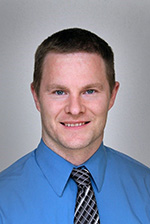Investigators
Christopher Doering, PhD
Associate Professor, Department of Pediatrics
Emory University School of Medicine
Aflac Cancer and Blood Disorders Center, Children's Healthcare of Atlanta
Dr. Doering is a geneticist and molecular biologist with a longstanding interest in coagulation factor VIII biology and gene therapy. His laboratory is focused on both the basic science and translation of cell and gene therapy technologies including i) gene therapy of hemophilia A using both liver-directed adeno-associated viral vectors and hematopoietic stem cell-directed lentiviral vectors, ii) bioengineering coagulation factors through ancestral sequence reconstruction, iii) understanding the immune response to the factor VIII in the setting of gene therapy and 4) the development of novel technologies that improve gene transfer efficiency and safety (e.g. microfluidic transduction devices and stem cell immunotoxins).

Wilbur Lam, MD, PhD
Associate Professor
Emory University School of Medicine
Wallace H. Coulter Department of Biomedical Engineering
Dr. Lam has a unique background as a physician-scientist-engineer and clinical pediatric hematologist. His interdisciplinary laboratory serves as a “one-stop shop” in which in vitro microsystems are developed to study the biophysics of hematologic processes in both health and disease and then translated to the patient bedside. Specifically, the Lam lab’s research interests involve the development and application of microsystems and microfluidic devices to enable research in the biophysical mechanisms of hematologic diseases such as sickle cell disease and bleeding and thrombotic disorders, as well as further developing those systems into novel therapeutics and diagnostic devices.
View Website
Renhao Li, PhD
Professor of Pediatrics
Emory University School of Medicine
Aflac Cancer and Blood Disorders Center, Children's Healthcare of Atlanta
Dr. Li’s research is on platelets and ligands, the associated diseases and potential therapeutics. He is an international expert on the GPIb-IX-V receptor complex, von Willebrand factor, and related thrombotic and thrombocytopenic disorders. He has also recently developed protocols of hydrogen-deuterium exchange mass spectrometry to map interactions within large protein complexes.

John S. (Pete) Lollar, MD
Hemophilia of Georgia Professor of Pediatrics
Emory University School of Medicine
Aflac Cancer and Blood Disorders Center, Children's Healthcare of Atlanta
Dr. Pete Lollar is a hematologist in the Aflac Cancer and Blood Disorders Center in the Department of Pediatrics at Emory University. He has had a longstanding interest in the structure and function of fVIII and translational research related to the hemophilias. He is the inventor of Obizur, a recombinant factor VIII molecule that has been approved for clinical use in the U.S., Canada, Switzerland, and the members of the European Union.

Shannon Meeks, MD
Associate Professor, Department of Pediatrics
Emory University School of Medicine
Aflac Cancer and Blood Disorders Center, Children's Healthcare of Atlanta
Dr. Meeks has a basic, translational, and clinical research interest in hemophilia and inhibitors. Her current projects focus on understanding the early stages of the immune response to factor VIII and understanding how individual profiles of inhibitor epitopes influence a patient’s response to treatment with both FVIII and bypassing agents, as well as response to immune tolerance therapy.

H. Trent Spencer, PhD
Associate Professor, Department of Pediatrics
Director of Gene Therapy Program
Emory University School of Medicine
Aflac Cancer and Blood Disorders Center, Children's Healthcare of Atlanta
Dr. Spencer is currently the Director of the Cell and Gene Therapy Program within the Aflac Cancer and Blood Disorders Center. His research focuses on developing cell and gene therapy treatments for hemophilia using lentiviral and adeno-associated viral vectors. Most recently, he is studying the effectiveness of incorporating various high expressing genetically engineered factor VIII transgenes into gene transfer vectors.

P. Clint Spiegel, PhD
Professor of Biochemistry
Western Washington University
Dr. Spiegel has been involved in factor VIII structural biology for almost 20 years, having determined the first X-ray crystal structure of a B domain-deleted factor VIII construct and multiple factor VIII/antibody inhibitor complexes. His lab principally employs X-ray crystallography and small angle X-ray scattering (SAXS) to characterize factor VIII complex structures at or near atomic resolution. X-ray crystallography and SAXS are complementary techniques that allow for the study of defined protein complexes and their respective dimensions, thus requiring protein formulations that are pure and structurally uniform.

Sean Stowell, MD, PhD
Medical Director, Center for Apheresis, Emory University Hospital
Assistant Professor, Department of Pathology and Laboratory Medicine, Emory University School of Medicine
Sean Stowell is a physician-scientist at Emory University School of Medicine. In addition to serving as the medical director of clinical apheresis at Emory University Hospital, his research lab studies the immune response to various therapeutic interventions, including transfused blood products and recombinant proteins. More specifically, his lab is interested in understanding key initiating factors that regulate host immune recognition and response to factor VIII.
